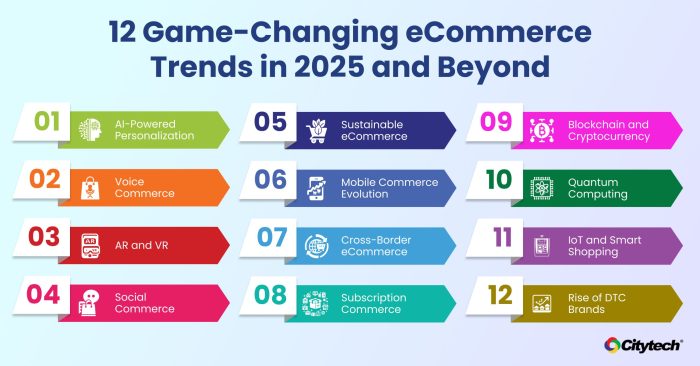Embarking on a journey to explore the Best Ecommerce Marketing Trends to Watch in 2025, this introduction sets the stage for an enlightening discussion on the evolving landscape of digital commerce.
Delve into the upcoming trends that will shape the way businesses connect with consumers in the online realm.
Overview of Ecommerce Marketing Trends in 2025
In today's fast-paced digital world, keeping up with the latest marketing trends is crucial for businesses looking to succeed in the ecommerce industry. With the landscape constantly evolving, staying ahead of the curve can give companies a competitive edge and help them reach their target audience effectively.Key factors that are expected to drive the evolution of ecommerce marketing strategies by 2025 include the continued growth of mobile commerce, the rise of artificial intelligence (AI) and machine learning, the increasing importance of personalization, and the impact of sustainability and ethical consumerism on purchasing decisions.Emerging technologies such as augmented reality (AR), virtual reality (VR), and voice search are also expected to play a significant role in shaping the future of ecommerce marketing.
These technologies have the potential to enhance the shopping experience for customers, making it more interactive, immersive, and personalized.Overall, businesses that adapt to these trends and leverage the power of technology in their marketing strategies are likely to see greater success in the highly competitive ecommerce landscape of 2025.
Personalized Customer Experiences
Personalized customer experiences play a crucial role in the success of ecommerce businesses. By tailoring marketing strategies to individual customer preferences, businesses can enhance customer satisfaction, loyalty, and ultimately drive sales.
Customized Product Recommendations
- Ecommerce businesses can utilize customer data such as browsing history, purchase behavior, and demographic information to offer personalized product recommendations.
- By implementing recommendation algorithms powered by AI and machine learning, businesses can suggest products that are relevant to each customer's unique interests and preferences.
- This personalized approach not only increases the likelihood of a purchase but also improves the overall shopping experience for customers.
Personalized Email Campaigns
- Segmenting customers based on their behavior and preferences allows ecommerce businesses to send targeted and personalized email campaigns.
- AI-driven email marketing tools can analyze customer interactions with previous emails to deliver tailored content and promotions that are more likely to resonate with each individual.
- Personalized email campaigns have higher open rates, click-through rates, and conversion rates compared to generic mass emails.
Enhanced Customer Service
- AI-powered chatbots can provide personalized assistance to customers by understanding their queries and offering relevant solutions in real-time.
- By leveraging machine learning algorithms, chatbots can continuously improve their responses based on customer interactions, leading to more accurate and efficient support.
- Personalized customer service experiences create a sense of trust and loyalty, driving repeat purchases and positive word-of-mouth referrals.
Omnichannel Marketing Strategies
In 2025, omnichannel marketing strategies are crucial for ecommerce businesses to provide a seamless and integrated shopping experience across various channels.
Traditional Marketing vs. Omnichannel Strategies
- Traditional marketing typically focuses on individual channels like email or social media, while omnichannel strategies involve integrating multiple channels such as websites, mobile apps, social media, and physical stores.
- Omnichannel marketing provides a cohesive customer journey, allowing customers to transition between channels effortlessly, leading to a more personalized and engaging experience.
- Unlike traditional marketing, omnichannel strategies focus on building long-term relationships with customers by delivering consistent messaging and experiences across all touchpoints.
Enhancing Customer Experience through Integration
- Integrating various channels enables businesses to gather data from different sources, allowing for a better understanding of customer behavior and preferences.
- By connecting online and offline channels, businesses can offer services like click-and-collect, where customers can order online and pick up in-store, enhancing convenience and flexibility.
- Personalized recommendations and targeted promotions can be delivered seamlessly through omnichannel strategies, increasing customer engagement and loyalty.
Sustainability and Ethical Practices
The growing importance of sustainability and ethical practices in ecommerce marketing has become a key focus for brands looking to align with consumer values and preferences. As more consumers prioritize environmental and ethical considerations in their purchasing decisions, brands are adapting their strategies to meet these demands.
Incorporating Sustainability into Marketing Strategies
- Using eco-friendly packaging and materials to reduce waste and carbon footprint.
- Partnering with sustainable suppliers and manufacturers to ensure ethical sourcing of products.
- Implementing recycling programs or offering incentives for customers to recycle products.
- Communicating transparently about sustainability efforts through marketing campaigns and messaging.
Consumer Trends towards Environmentally Conscious Brands
- Consumers are increasingly seeking out brands that prioritize sustainability and ethical practices.
- Studies show that a majority of consumers are willing to pay more for products from environmentally conscious brands.
- Social media and online reviews play a significant role in influencing consumer perceptions of a brand's sustainability efforts.
- Brands that effectively communicate their commitment to sustainability often see increased customer loyalty and engagement.
Voice Commerce and Conversational Marketing

Voice commerce and conversational marketing are reshaping the way customers interact with ecommerce platforms. As technology continues to advance, businesses are leveraging voice assistants and chatbots to enhance the overall shopping experience for consumers.
Voice Commerce Impact on Ecommerce Transactions
Voice commerce allows customers to place orders, make payments, and get personalized recommendations using voice commands. This hands-free approach streamlines the buying process, making it convenient for users to shop anytime, anywhere. With the rise of smart speakers and virtual assistants like Alexa and Google Assistant, voice commerce is becoming increasingly popular among consumers.
Conversational Marketing with Chatbots
Chatbots are revolutionizing customer interactions by providing instant support and personalized recommendations based on user preferences. These AI-powered tools engage with customers in real-time, answering queries, resolving issues, and guiding them through the purchase journey. Conversational marketing helps businesses build stronger relationships with customers and improve overall satisfaction levels.
Benefits and Challenges of Voice Commerce and Conversational Marketing
- Benefits:
- Enhanced User Experience: Voice commerce offers a seamless shopping experience, reducing friction and enhancing convenience for customers.
- Personalization: Conversational marketing tools enable businesses to deliver personalized recommendations and targeted promotions based on customer preferences.
- Improved Customer Engagement: Chatbots engage with customers in a more interactive and personalized manner, leading to higher engagement and conversion rates.
- Challenges:
- Data Privacy Concerns: Collecting and processing voice data raises privacy and security issues, requiring businesses to ensure compliance with data protection regulations.
- Integration Complexity: Implementing voice commerce and chatbots into existing ecommerce platforms can be complex and require technical expertise.
- User Adoption: Some customers may be hesitant to adopt voice commerce due to concerns about accuracy, security, and privacy.
Wrap-Up
As we conclude our exploration of the Best Ecommerce Marketing Trends to Watch in 2025, it becomes evident that staying ahead of the curve is crucial for success in the competitive world of ecommerce.
FAQs
What role do emerging technologies play in shaping the future of ecommerce marketing?
Emerging technologies such as AI and machine learning are driving forces behind the evolution of ecommerce marketing strategies by 2025, enabling businesses to create more personalized customer experiences and optimize their marketing efforts.
How can ecommerce businesses incorporate sustainability into their marketing strategies?
Ecommerce businesses can integrate sustainable practices by promoting eco-friendly products, using recyclable packaging, and supporting ethical supply chains. By aligning with consumer trends towards sustainability, brands can attract environmentally conscious customers.
What is the significance of omnichannel marketing in 2025?
Omnichannel marketing emphasizes the seamless integration of various platforms and channels to provide a cohesive customer experience. In 2025, this approach will be crucial for businesses to engage customers across multiple touchpoints and enhance overall brand visibility.





